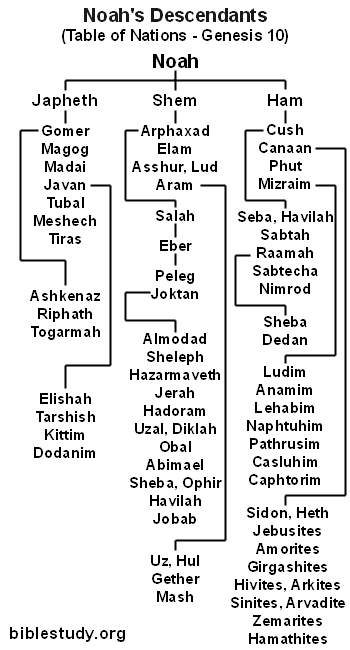The tenth chapter of Genesis delineates seventy descendants (twenty-six from Shem, thirty from Ham and fourteen from Japheth) who were born after the waters of Noah's flood subsided. The number 70, many times, symbolizes judgment or a perfect spiritual order and is the foundation of the table.
Jacob's family, for example (which came out of Shem's line in the table of nations), which totaled seventy, left the land of Canaan to migrate to Egypt (Genesis 46:27). Moses was commanded to appoint seventy elders to help him govern the children of Israel (Numbers 11:16 - 17).
It should be noted that the table of nations in Genesis 10 is not a complete list of all the descendants of Noah produced directly after the deluge.

In Genesis 11 it states that men such as Arphaxad, Salah, Eber and others had many other male progeny other than what is recorded (Genesis 11:11, 13, 15, etc.). These men, as well as Noah's sons and others found in the table, also produced daughters who are not specifically named (Genesis 11).
The above table of Noah's descendants places special emphasis on the peoples and nations that came out of Shem (whose name means "renown") because, through him, came Abraham, the Israelites and the Messiah. One of his sons, Elam, migrated to a land named after him and started a people who would affect the course of Biblical history.
Shem's Descendants
Chedorlaomer, king of Elam, was a powerful leader who led others to victory in the first military campaign mentioned in the Bible (Genesis 14). The people of Elam became the foundation on which the mighty Persian Empire was built (Antiquities of the Jews, Book 1, Chapter 6, Section 4).
Shem's son Asshur (the grandson of Noah), who descendants are not listed in the above table, settled in an area near the Tigris River in northern Mesopotamia. They eventually gave rise to the mighty nation of Assyria, which is considered the first large power in human history. Shem's grandson Uz has the shortest name in the Bible. The land named after him is the place where Job lived (Job 1:1).
Two sons of Joktan (Ophir and Havilah), a son of Cush (Raamah) and one of Raamah's sons (Sheba) lent their names to regions that were anciently renowned for their gold deposits (Genesis 2:11, 1Kings 9:28, Job 28:16, Ezekiel 27:22, etc.).
Ham's Descendants
The land of Canaan (Genesis 10:19), later referred to as Palestine, the Promised Land, the nation of Israel and other designations, was given its name through one of Ham's sons who settled in the area. Sidon, which the table of nations shows is the eldest son of Canaan, founded a city on the Mediterranean Sea that was known for its trade, commerce and wealth.
And Canaan begat Sidon, his firstborn, and Heth, and the Jebusite and the Amorite, and the Girgashite, and the Hivite, and the Arkite, and the Sinite,
and the Arvadite, and the Zemarite, and the Hamathite; and afterward the families of the Canaanites were spread abroad (Genesis 10:15 - 18, HBFV).
The Jebusites, named after another of Canaan's sons, inhabited the city of Jebus at the time of King David. David overtook the city, renamed it Jerusalem, and made it his capital.
And David and all Israel went to Jerusalem, which is Jebus, where the Jebusites were the people of the land (1Chronicles 11:4, HBFV).
Utilizing the table of nations, several Biblical commentaries (The Bible Knowledge Commentary, Bible Reader's Companion, and others) state that some of Kittim's (the great-grandson of Noah) descendants settled the island of Cyprus. This island was the location where the New Testament apostle named Barnabas grew up (Acts 4:36). One of Kittim's brothers, Dodanim, is believed to have settled in the island of Rhodes (Holman Bible Dictionary).